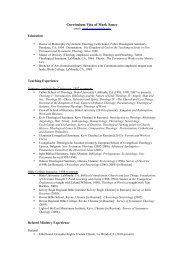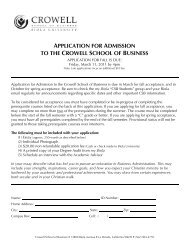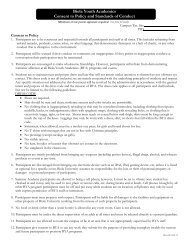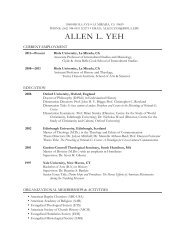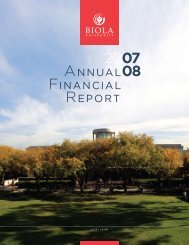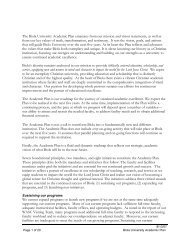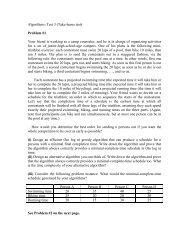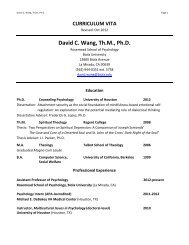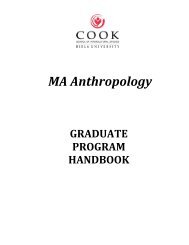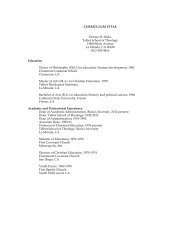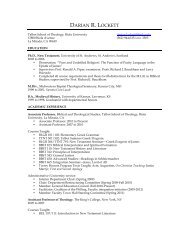You also want an ePaper? Increase the reach of your titles
YUMPU automatically turns print PDFs into web optimized ePapers that Google loves.
Mass Communication<br />
Faculty<br />
Chair: ............................................................................ Craig Detweiler, M.F.A.<br />
Professor: ..............................................................................Gonzales, Tarpley<br />
Associate Professors: ....................................................Detweiler, Fisher<br />
Assistant Professors: ........................................................................Schmidt<br />
Objectives<br />
The Mass Communications Department equips students to serve as<br />
observers, interpreters, creators and patrons of mass media. We offer<br />
students a thorough grounding in the theory, research and practices<br />
of Mass Communication. We begin with an understanding of the<br />
ancient arts and aesthetics inherent in storytelling. Students will<br />
learn the history of their discipline, developing the research skills and<br />
critical thinking necessary to recognize their position in relationship<br />
to critical junctures in Mass Communications. Finally, students will<br />
polish and practice a particular craft. Our graduates will see their career<br />
and calling as comparable to the art of poets, painters, sculptors,<br />
historians, and politicians. They will be empowered to celebrate the<br />
innate, precious, God-given gift of life, the person and work of Jesus<br />
Christ, and the ongoing, surprising activity of the Holy Spirit. They will<br />
work out those enduring truths in the rapidly evolving, technologically<br />
driven, highly-competitive world of Mass Communication.<br />
Degree Programs<br />
Upon completion of the university baccalaureate and major requirements,<br />
the Mass Communication Department offers the Bachelor of<br />
Arts degree in two majors:<br />
• Journalism<br />
• Film / TV / Radio<br />
Majors<br />
j o U r n a l I s m<br />
The <strong>Biola</strong> <strong>University</strong> Journalism program is designed to blend attention<br />
to a traditional academic emphasis in critical thinking with concern<br />
for professional skills. This balance has the potential to prepare<br />
alumni to secure and retain employment in the profession as well as<br />
it prepares them to gravitate to places of professional leadership.<br />
Responding to an industry trend toward convergence, the journalism<br />
major prepares students for a career in various areas of professional<br />
journalism work, including news — whether it is delivered by radio,<br />
television, print, or Internet — or for a career in public relations.<br />
Students will enroll in a number of core courses and complement<br />
these with a number of elective courses. Students will move through<br />
classes, practicum experiences and internship activities with the goal<br />
of preparing to effectively make a transition from the classroom to<br />
the profession.<br />
News Emphasis<br />
Students electing to take a news emphasis will complete a total of 45<br />
units of which 24 must be upper division.<br />
The 27-unit core in news includes: 106, 1<strong>07</strong>, 110, 202, 225, 231, 3<strong>05</strong>,<br />
332, 433 and 461. In addition, students are required to enroll in a<br />
minimum of three practicums for a minimum of three units and a<br />
minimum of three units in internship. Twelve units of electives will be<br />
selected with the approval of a journalism advisor.<br />
Public Relations Emphasis<br />
Students electing to take a public relations emphasis in the program<br />
will complete a total of 45 units of which 24 must be upper division.<br />
The 30-unit core in public relations includes 106, 1<strong>07</strong>, 111, 202, 225,<br />
232, 3<strong>05</strong>, 332, 389, 433 and 461. In addition, students are required<br />
to enroll in a minimum of three practicums for a minimum of three<br />
units and a minimum of three units in internship. Nine units of electives<br />
will be selected with the approval of a journalism advisor.<br />
Note: Public Relations students are encouraged to enroll in Business<br />
230, Introduction to Marketing, as a general education elective, since<br />
it is a prerequisite to all marketing courses. Public Relations students<br />
also would be well-served to consider enrolling in additional business<br />
/ marketing courses, including but not limited to Business 332,<br />
337 and/or 453.<br />
f I l m -t e l e v I s I o n - r a d I o<br />
<strong>Biola</strong>’s Film-Television-Radio program seeks to usher in a new renaissance<br />
in mass media. We follow God as the ultimate creative force<br />
and communicate this with the world around us. Our location in<br />
Southern California allows us to access media professionals working<br />
in Hollywood, securing guest speakers, prime internships and additional<br />
resources via our <strong>Biola</strong> Studio Task Force.<br />
A Film / TV / Radio major is 45 units, of which 24 must be upper division.<br />
Choose one of the emphases listed below.<br />
Media Management Emphasis<br />
A media management emphasis introduces students to the business<br />
principles that drive the entertainment industry. Media managers<br />
make the strategic decisions regarding what films get produced and<br />
what TV shows get broadcast. By combining classes in Mass Comm<br />
and Business, students will be equipped to serve as producers or<br />
development and marketing execs, en route to corporate management.<br />
Students who choose this emphasis must include: 202, 204,<br />
358, 359 or 460, 433, 440, 456 and Business 211, 212, 220, 230, 328<br />
and either MCOM 355 or MCOM 449, MCOM 470 or BUS 453, and<br />
MCOM 455 or BUS 434.<br />
Production Emphasis<br />
A production emphasis offers students a thorough grounding in<br />
the creation of film, television or audio-based media. Students are<br />
encouraged to develop their technical skills, training for positions as<br />
112 Undergraduate Programs B I O L A U N I V E R S I T Y



